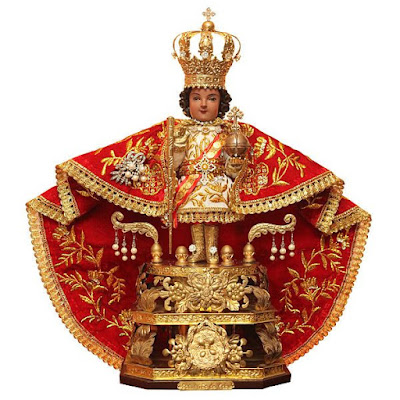THE CHILD OF NAZARETH, THE HOLY INFANT.
January 17, 2021
FEAST OF SANTO NIÑO.
READINGS: Is 9:1-6; Ps 97 (98):1-6; Eph 1:3-6,15-18; Mk 10:13–16.
An Amerindian proverb says, “The ones that matter most are
the children. they are the true human beings.” And a Japanese proverb adds,
“Parents and children teach one another.”
The Son of God humbled himself to share in our humanity and
he did so, through the figures of a child, a holy innocent, and defenseless
infant.
The solemnity of the Santo Niño, (Holy Infant), Principal
Patron of the Philippines takes us back to Christmas time. We live and journey
anew, for a day, with the little baby in the hands and under the care of his
parents, principally, Mary his Mother. Rightly, authors and exegetes agree that
the feast of the Santo Niño is a "Balik Pasko". Nevertheless, it
comes as a great challenge to us all on our relationship with children and how
do we welcome and educate them.
The feast of the Santo Niño teaches us that infancy or
childhood is a stage of holiness. The children are born holy. They only lose
that holiness with their contact with adults. Rightly, we can also affirm that
children become what we want and do of them.
Celebrating today's solemnity of the Santo Niño, I will like
to center our meditation on children and their education. The opening prayer
already immerses us in that thematics. The only Son of God, begotten from all
ages, humbled himself as a child of Nazareth and became subject to Mary and
Joseph. Through that, the Lord wants us to learn from his example to embrace
his will in all things and, holding fast to the dignity of all, serve our lowly
brothers and sisters with open hands and gentle heart. Two points here, for the
education of children: humility and dignity. Children are the most beautiful
sign of Christian humility. As such, they have their dignity that should be
respected and protected. Any system of education that does not value or promote
the dignity of children is an abuse of their rights.
The first reading reminds us that Children are a gift from
God. The prophet Isaiah tells us that in the coming of the Emmanuel, "a
son is given to us." He is entrusted to each of us with power and
authority. He has dominion over his shoulders, bearing the name of
"Wonderful-counsellor, Mighty-God, Eternal-Father, Prince-of-Peace. Those
attributes of the Divine Savior are also endorsed to each child at his birth.
It is now up to the parents and the society to awaken them in their children.
For sure, social and financial situations play a lot in the education of
children, but dignity has no cost and humility can open to the right education.
St. Paul, in his address to the Ephesians, tells us that we
all are chosen by God to be his adopted children. That is, to share in the
dignity of Christ, the dignity of the children of God. God wants us all,
"holy and spotless, and to live through love in his presence..." We
all are created for a purpose. Every child is born for a purpose. Only the
right education can help discover and meet that purpose.
Then the Gospel comes to teach us how to relate with
children. The Lord tells his followers that children need to be welcomed,
loved, protected, and valued. For, anyone who welcomes a little child in his
name welcomes him. The way we relate to children says a lot about our
relationship with God.
People today dream of the first position, power, dominion,
fame. In so doing, we relegate all the values such as humility, simplicity, and
even innocence into remote and off-date values. And not only do we no longer
count them as value, but we abuse the rights of the little ones, the poor, and
the innocent children. To pursue their dream of authority and power, many do
not hesitate to kill children. Abortion, child abuse, mistreatment, lack of
education... these are things our societies reserve do to children.





Comments
Post a Comment